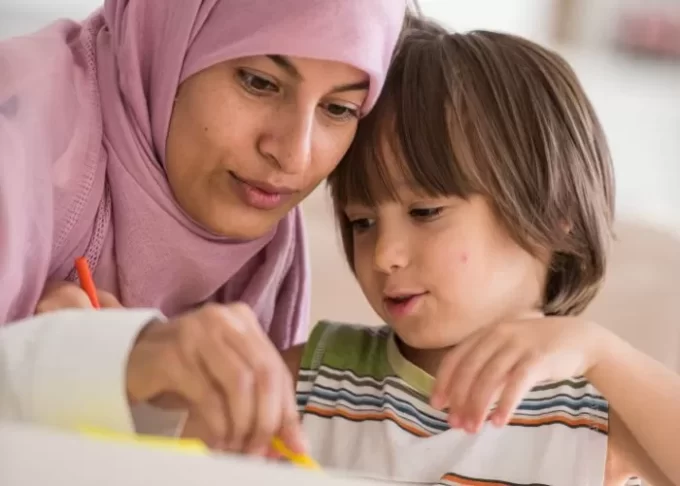New Year is often an important moment for many people to reflect on the past and plan for the future. From an Islamic perspective, the new year can be used as an opportunity to improve oneself, strengthen one’s relationship with Allah SWT, and design more meaningful resolutions. Even though the change of the Gregorian year is not part of Islamic law, Muslims can take lessons from this moment by sticking to Islamic values. The following are several important steps that can be taken to welcome the new year from an Islamic perspective.
1. Self-Introspection: Calculating your deeds and mistakes
Islam places great emphasis on the importance of muhasabah or self-introspection. The turn of the year is an ideal moment to reflect on what we have done over the past year. As Allah says in the Qur’an:
“O you who believe, fear Allah and let everyone pay attention to what he has done for tomorrow” (QS. Al-Hasyr: 18).
This self-reflection includes an evaluation of obligatory worship, such as prayer, fasting, zakat, and other sunnah worship, as well as our behavior in daily life. Have we maintained good relationships with family, neighbors, and others? Or are there still mistakes that must be corrected? be fixed?
Muhasabah also involves evaluating the sins that may have been committed. The Prophet Muhammad (PBUH) said: “Every son of Adam is guilty, and the best of those who are guilty are those who repent” (HR. Tirmidhi). With honest muhasabah, we can begin new and better steps.
2. Making Resolutions Focusing on Good Deeds
After introspection, the next step is to make resolutions that focus on good deeds. These resolutions are not just wish lists, but must reflect a sincere intention to improve relationships with Allah and others. human.
For example, if we have often postponed prayer before, make a commitment to be more punctual. If we have rarely read the Qur’an, plan a daily or weekly target to read it, even study its interpretation. Not only that, we can also set social worship targets, such as setting aside some of our income for charity every month.
This resolution should be specific, realistic, and measurable. That way, it is easier for us to control and evaluate the achievement of the resolution throughout the year.
3. Improve Relationships with Others: Starting the Year with a Clean Heart
The turn of the year can be a good time to improve social relationships. In Islam, maintaining ukhuwah (brotherhood) is part of an important teaching. The Prophet Muhammad SAW said:
“It is not lawful for a Muslim to ignore his brother for more than three days” (HR. Bukhari).
If there is a conflict or strained relationship with family, friends, or colleagues, make this moment to apologize or start communication again. This action not only resolves the conflict, but also brings peace of mind and strengthens ties .
In addition, improving social relationships can be done by helping others, providing moral support, or even simply spreading kindness through positive words.
4. Make plans that are in accordance with Sharia
Every Muslim is taught to have good planning, because planning is part of human effort, while the results are left to Allah SWT. Rasulullah SAW said:
“If you put your trust in Allah with true trust, surely Allah will give you sustenance as He gives sustenance to birds that go in the morning with an empty stomach and come home with a full stomach” (HR. Tirmidhi).
The plans prepared can include spiritual aspects, such as increasing worship, as well as worldly aspects, such as education, career or business. Most importantly, make sure each plan is in accordance with halal principles and aims for the benefit. Include prayer in every planning step, so that our efforts will be blessed by Allah.
5. Avoid excessive and useless celebrations
In welcoming the New Year, many people are caught up in euphoria and excessive celebrations, such as New Year’s Eve parties or useless activities. Islam teaches to maintain balance and avoid excessive attitudes. Rasulullah SAW said:
“Indeed, Allah does not like those who exaggerate” (QS. Al-A’raf: 31).
As an alternative, Muslims can fill New Year’s Eve with more meaningful activities, such as dhikr, evening prayers, or attending Islamic studies. This not only gives you peace of mind, but also brings you closer to Allah.
6. Strengthening Commitment to Spiritual Hijrah
New Year is the right time to start hijrah, which is moving from bad habits to better habits. This hijrah can be in the form of leaving bad traits such as envy, laziness, or the habit of procrastinating.
As the Prophet Muhammad SAW said: “The one who migrates is the one who leaves what Allah has forbidden” (HR. Bukhari).
Spiritual hijrah also means improving intentions and improving the quality of worship. For example, if previously prayer was done merely to fulfill an obligation, make this moment to improve devotion in prayer. With consistent hijrah, we can live the new year with new enthusiasm and better intentions.
Conclusion
The new year in the Islamic perspective is not about celebration, but about using time to improve ourselves. With introspection, making resolutions, improving relationships, planning steps forward, avoiding useless things, and strengthening spiritual hijrah, we can make the new year a meaningful moment. May Allah grant us blessings and ease in living the coming year.
souerce img : madrasahdigital.co









Leave a comment